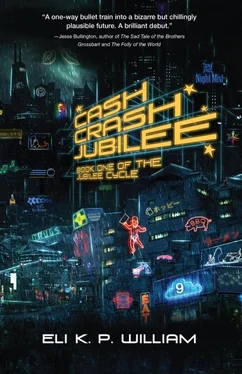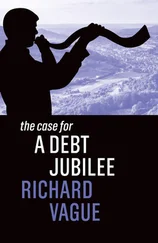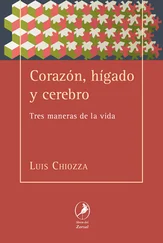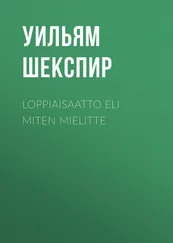Eli K. P. William

This novel is dedicated to Lee Maracle, for convincing me that I couldn’t write; to Albert Moritz, for convincing me that I could; and to Maiko Takemoto, for her unwavering faith and support throughout its writing.
Apane of darkness descended on the room for an instant, blacking out the hazy image of a man sitting in a garden, like a curtain falling on a mid-performance stage.
These fleeting slivers of absence came and went intermittently, relentlessly, and Amon Kenzaki did his best to fight them off for as long as he could bear, in the hopes of filling his bank account. But it wasn’t easy, even for him.
For the umpteenth time, the man in the garden said: “Blinking is money. Blinking is choice. Blink less to save yourself, to save yourself, to save your moneeee—” He extended the final vowel, humming it in monotone until his voice grew crackly and he ran out of breath.
Sitting alone on a chair in his apartment, Amon was taking an online blink reduction seminar. By mastering this simple method, the promotional video had promised, students could reduce their number of blinks per minute and, with daily practice, retrain their eyelids until blinking less frequently became automatic.
The man in the garden was called “the guru.” No one seemed to care if he had another name, least of all Amon. He had richly-tanned skin and long silken hair tied in a ponytail. He sat on an emerald green rug, his legs crossed with each foot resting on the opposite thigh, his hands stacked palms down on his lap and his eyes half-closed. A gray shawl, with a pattern of lustrous, burgundy stitching looping elegantly along the edges, was wrapped diagonally over his right shoulder and around his waist. In front of him was a still, clear pond. Behind, lush ferns bowed out of porcelain flower pots the size of kegs. The pond reflected the guru’s seated form along with the garden background. The reflection and the original evenly split Amon’s visual field top to bottom, forming a symmetrical double-image like a mandala. This scene was projected for Amon on his eyescreen, a display integrated with his eyes, appearing as a semitransparent overlay on the cream-colored walls of his room. Every time he blinked it disappeared for a fraction of a second and returned.
“Find the space without space where the eyelid meets the brow,” said the guru. “There in the emptiness you will find the frugal mind, the parsimonious mind, the creditable mind.”
Amon sat motionless on a fold-up chair with his spine straight, his feet flat on the floor, and his palms resting on his thighs while listening intently to the lesson. As instructed, he focused on the top of his eyelids. The trick was to keep the eyes open until they felt dry but close them just before they started to sting. Close too early and the time until the next blink would be that much shorter. Wait too long and the body would detect strain and compensate by making the eyes more sensitive, hastening the onset of stinging in the next blink cycle and spurring a premature shut. But with consummate timing, the duration of the dry sensation could be extended to its limit, and with successful repetition, the eyes would gradually adjust, incrementally postponing stinging and lengthening the period between each blink nanosecond by nanosecond.
After a few minutes of silence, the guru repeated his mantra: “Blinking is money. Blinking is choice. Blink less to save yourself, to save yourself, to save your moneeee—” Many voices joined in unison with the guru, layering over and amplifying his voice. Unlike the other students participating from their various locations, Amon remained silent. The website audio settings made the guru’s voice loudest, and the heavily-accented Japanese he spoke stood out in the mix. It was difficult for Amon to identify what kind of accent. It might have been Indian; it might have been Chinese; it might also have been German, or a hybrid of all three. Whatever the origin, distinctive pronunciation and intonation endowed the guru with a certain exotic authority, as though coming from a distant, undefined land were a prerequisite to be an authentic master of frugality. The guru went quiet, leaving the students to chant without him. Placid intensity seemed to radiate from his tanned forehead, as though he were deeply focused on something… perhaps his eyelids.
“Blinking is money.” Amon reflected on this phrase. The wording was a bit crude, but he had to admit the statement was true. More blinking=less money. Less blinking=more money. Like every other action, blinking was a kind of intellectual property, the usage of which required payment of a licensing fee. Every time he blinked, jumped, sang, downloaded music, played hopscotch, ate a waffle, or did anything by choice, the network of sensors and chips implanted invisibly under his skin detected the corresponding muscle movement and nerve signals. This embodied computer system—his BodyBank—then transferred the action-data to GATA, which checked who owned the rights to the action-property at that moment and gave them permission to withdraw the money instantly from his account.
A single blink wasn’t all that expensive. In fact, compared to other daily actions like walking and eating, the price of each blink in the action-transaction marketplace was relatively cheap. But people were incessantly blinking, thought Amon, and the costs added up like grains of sand falling one by one through an hourglass until, before you knew it, a significant portion of creditime had been spent.
Differentiating the sensation of dryness from stinging and anticipating the critical moment before one changed to the other required a subtle awareness that took weeks to cultivate, and full habituation of the eyes took many months more. This meant a sizeable investment of creditime, but it seemed worth it to Amon. According to PennyPinch, his accounting consultant application, the cost of tuition would be paid off in one month if he could cut down by a quarter blink per minute—a conservative estimate given that the website promotional video had promised a reduction by two.
However adept he became though, blinking costs could never be brought to zero. A certain portion of every day required the use of sight—working and commuting hours at the bare minimum—during which time blinking was inevitable; and, as Amon was pained to admit, any attempt to keep his eyes constantly peeled would be overridden by reflexes that protected them from damage. Keeping the eyes closed too long—even while resting—was equally risky in its own way, as GATA might interpret this as sleeping, napping, daydreaming , or some such action even more pricey than blinking . Amon remembered an era when squinting had been the trendy alternative in cost-cutting circles, but the fee had risen over the years perhaps due to increased demand, making this approach no longer feasible. Easy shortcuts were invariably false trails when it came to budgeting. The essence of deep frugality was devoted training; meticulously honing choices in the narrow realm of volition left for Free Citizens between involuntary bodily functions and the uncontrollable world, as though walking a tightrope between the twin precipices of fate.
Without changing his upright posture, the guru picked up a handful of lavender petals from a straw basket at his left side and tossed them into the pond. The petals fluttered briefly in the air as they fell, bleached almost white in the sunlight, before landing gently in the water. Circular ripples expanded outwards from each impact point, colliding with each other and breaking into fragments of intersecting arcs that wavered on the verge of dissolution. Some petals remained floating on the elastic tension of the water’s surface, and others, located at the meeting point of multiple subtle waves, were engulfed by the gentle sloshing and sank slowly out of sight.
Читать дальше














